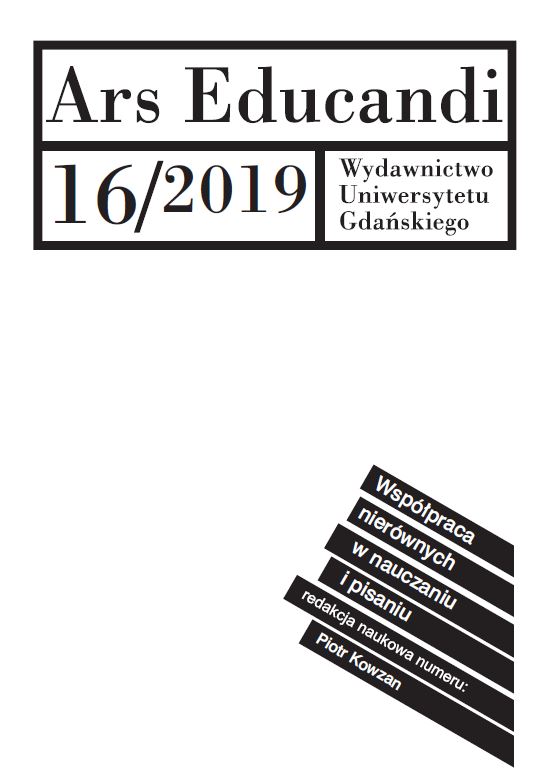O zmianie hierarchicznego paradygmatu uniwersyteckiej zależności student–wykładowca w świetle działalności portugalistycznego koła przekładoznawczego Amor-Não-Me-Deixes
DOI:
https://doi.org/10.26881/ae.2019.16.08Słowa kluczowe:
delegowanie kompetencji, przekład, samodzielność ucznia, CLILAbstrakt
Założeniem niniejszego artykułu jest pokazanie, jak tradycyjny hierarchiczny model nauczania może zostać usprawniony poprzez modyfikację relacji nadrzędności „mistrz/uczeń” i zamianę jej na efektywny model równorzędnej współpracy w ramach fakultatywnych spotkań przekładoznawczego koła naukowego celem realizacji praktycznych projektów, których założeniem wyjściowym jest zaistnienie w otwartej przestrzeni kulturowej (pokaz, festiwal filmowy lub publikacja). Równorzędni uczestnicy zadania przekładoznawczego uczą się nie tylko języka, faktów kulturowych zawartych w danym tekście, ale także praktycznych uwarunkowań przekładu i pracy w grupie, a co za tym idzie uczą się świadomie i odpowiedzialnie. Nie tylko oceniają innych, ale też przez innych są oceniani, a to prowadzi do rozwijania zdolności konstruktywnego myślenia krytycznego w ramach autorefleksji nad przekładem jako elementem edukacji językowej i teoretyczno-praktycznej w polu Translation Studies. Uczestniczy opisywanej sytuacji są ekspertami językowo-kulturowymi (w rozumieniu Vermeera), a także uczestnikami zintegrowanego modelu nauczania języka (CLIL). Przeniesienie w ramach współpracy eksperckiej ciężaru z tzw. power-over na układ power-with + power-to, prowadzi do osiągnięcia pożądanych w procesie uczenia learner autonomy i student empowerment.
Downloads
Bibliografia
Bednarczyk, A. (2008): W poszukiwaniu dominanty translatorskiej, Wydawnictwo Naukowe PWN, Warszawa.
Hejwowski, K. (2015): Iluzja przekładu, Śląsk – wyd. naukowe / Stowarzyszenie Inicjatyw Wydawniczych, Katowice.
Heydel, M. (2014): „Trzymam gardę” [w:] Zaleska, Z. (org.): Przejęzyczenie. Rozmowy o przekładzie, Czarne, Wołowiec 2015, s. 271-297.
Holmes, J. (1972 [2000]): “The name and nature of translation studies” [w:] Venuti, L. (org.): The Translation Studies Reader, Tylor&Francis e-Library, 172-185.
Jankowski, J. (2017): „Próba wieloaspektowej recepcji przekładu na przykładzie leksykonu Morze” [w:] Kujawska-Lis, E., Ndiaye, I. A. (red.): Komunikacja międzykulturowa w świetle współczesnej translatologii Tom VIII literatura – język – kultura, Olsztyn, s. 97-113.
Klimkowski, K. (2015): Towards a Shared Curriculum in Translator and Interpreter Education, PAN Wrocław / Wydawnicwo Wyższej Szkoły Pedagogicznej we Wrocławiu, Wrocław / Washington.
Koller, W. (1988 [2009]): „Przekład literacki z perspektywy językoznawstwa. Czynniki warunkujące przekład”, tłum. P. Zarychta [w:] Bukowski, P., Heydel, M. (red.): Współczesne teorie przekładu [antologia], Znak, Kraków, s. 145-172.
Little, D. (1991): Learner Autonomy 1: Definitions, Issues and Problems [wersja pdf: https://www.researchgate.net/publication/259874253_Learner_Autonomy_1_Definitions_Issues_and_Problems/link/56a7dcf608ae0fd8b3fe41c2/download ; dostęp: 15.11.2019].
Łukasiewicz, M. (2014): „Czary-mary w języku” [w:] Zaleska, Z. (org.): Przejęzyczenie. Rozmowy o przekładzie, Czarne, Wołowiec 2015, s. 155-177.
Melo, F. (scen.), Cavia, J. (rys.) (2018): Wampiry, tłum. J. Jankowski / Amor-Não-Me-Deixes (J. Konopelski, Ż. Orlik, J. Opolska, W. Orlińska, P. Stasiuk, E. Urbańczyk), Mucha Comics, Warszawa.
Pindel, T. (scenariusz), Chmielewski, D., Kołomycka, B., Sienicki, R., Świdziński, J., Vaucher, F. (rys.) (2019): W głowie tłumaczy, Instytut Kultury Miejskiej w Gdańsku/ kultura gniewu, Gdańsk.
Steiner, G. (1975 [2018]): Po wieży Babel. Aspekty języka i przekładu, tłum. Olga i Wojciech Kubasińscy, Aletheia, Warszawa.
Sullivan, A. M. (2015): The Nature of Student Empowerment [wersja pdf: https://www.researchgate.net/publication/255591390_The_Nature_of_Student_Empowerment/link/54ed942b0cf28f3e6535bc7d/download ; dostęp: 15.11.2019].
Tytler, A. F. (1792 [2014]): Esej o zasadach sztuki przekładowczej, tłum. K. F. Rudolf (tłum. tekstów greckich i łacińskich W. Waśniewska), Wydawnictwo Uniwersytetu Gdańskiego, Gdańsk.
Vermeer, H. J. (1989 [2000]): „Skopos and comission in translational actionˮ, tłum. A. Chesterman [w:] Venuti, L. (org.): The Translation Studies Reader, Tylor&Francis e-Library, s. 221–232.
Zupełnie Inny Świat #34 (09/2019): Cabo Verde, A. Nyckowski (red. nacz.), Fundacja Zupełnie Inny Świat, Warszawa.
Strony internetowe:
Stowarzyszenie Tłumaczy Literatury: http://stl.org.pl/
Studencki Ruch Naukowy na UW: http://www.rada.uw.edu.pl/baza.php?operacja=99&dzial_id=2
Tłumacz Google: https://translate.google.pl/?hl=pl

 Uniwersyteckie Czasopisma Naukowe
Uniwersyteckie Czasopisma Naukowe




